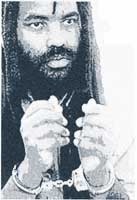EDITORIAL
Mumia, racism and the court
Published Apr 8, 2009 3:14 PM
In one of his weekly radio columns broadcast via telephone from prison, Black
revolutionary journalist Mumia Abu-Jamal recently spoke of “The other
inauguration celebration.” At the very same time that Barack Obama was
sworn in as president of the United States, he explained, guards at
Pennsylvania’s Camp Hill prison had launched an attack on Black inmates
there, according to an extensive report from FedUp!, the Pittsburgh chapter of
the Human Rights Coalition.
Said Mumia, “On the morning of the inauguration, one high-ranking guard
reportedly announced over the PA system: ‘He [speaking of Obama] may have
won, in my eyes he’s still a n——r.’” That was
followed by “a fit of beatings, electric stun gun (and shield) shocking,
kicking, punching and other such treatment, accompanied by a rash of racist
slurs by white guards against Black prisoners.”
Now Mumia himself is feeling the vengeance of the racist, ruling class
establishment that hired these thugs. The U.S. Supreme Court, which can wound
and kill with words instead of stun guns, has rejected his appeal for a new
trial without even giving any reasons. At a time when the electorate has chosen
an African American for president, the court’s action shows shocking
contempt for the hopes for unity and overcoming racism expressed by the
majority of voters.
Mumia is known and respected around the world precisely because his case is
seen as a monstrous example of racist injustice in the United States. His
appeal had invoked the precedent of the Batson decision, in which the
Supreme Court in 1986 ruled that a prosecutor could not use peremptory
challenges to exclude jurors based solely on their race.
At Mumia’s trial, the prosecutor had used 11 of his 15 allotted
peremptory challenges to exclude Black jurors. A training video used by the
Philadelphia district attorney showed this was a very conscious strategy of the
DA’s office. The video was part of the evidence presented to the court in
the recent appeal.
In response to the court’s decision, Mumia said, “It shows you that
precedent means nothing, that the law is politics by other means.” It
must be very hard for a man who has spent most of his adult life on death row
to be so profoundly objective about the limitations of the legal system. But
Mumia is no pessimist. This former Black Panther is a fighter. His statement
means that all who support him must keep up the struggle, because that is the
only way to secure justice—not through the courts or the ballot box, but
in the streets.
Articles copyright 1995-2012 Workers World.
Verbatim copying and distribution of this entire article is permitted in any medium without royalty provided this notice is preserved.
Workers World, 55 W. 17 St., NY, NY 10011
Email:
ww@workers.org
Subscribe
wwnews-subscribe@workersworld.net
Support independent news
DONATE


